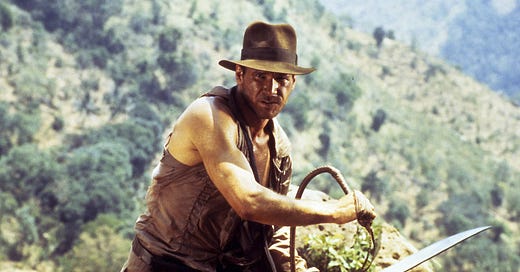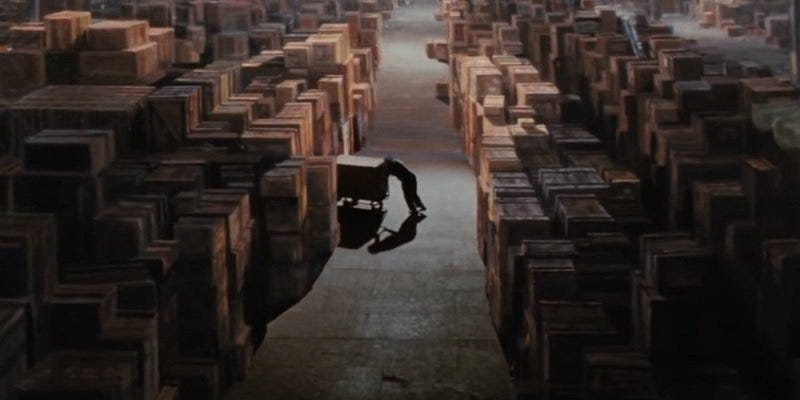Indiana Jones And The Lost Enchantment
On the curious indifference being shown to the butchering of a childhood classic
I realise I shouldn’t take the bait, but I decided to write something about the fact an Indiana Jones movie “dropped” and nobody cared. This is the point when people might roll their eyes or view commenting on it as just part of the content churn of a daily internet browse. I haven’t watched The Dial of Destiny and probably never will. I know the routine by now — just can’t be arsed. Movie critic YouTube will be cashing in with their takedown videos. I might watch one of those on a rainy afternoon sometime, but that’s about it.
I’ve seen a few clips going around. An ancient Harrison Ford is being berated by a woman who looks like a lesbian CEO of some London-based PR company. I can’t even be bothered to get angry anymore, nobody can, it’s why the first impression many people will have is that I’m plucking some low-hanging fruit in even writing about it. We’re not supposed to care any more. The heroes and worlds that we spent endless hours within in our childhood are casually butchered, but we all know the battle is lost, and so we “cope” by simply tuning out. I get it.
My parents had me (unexpectedly) when they were still in their late teens. This meant that I spent more time in the care of my grandparents than others of my age. My grandfather hadn’t yet retired and worked in a factory. This was convenient because he had access to a steady supply of knock-off VHS pirated films that he brought home. One day, he arrived home holding a black rectangle in a bag and told a much younger me, “I’ve been told you’ll like this one!”. And so it came to pass that Steven Spielberg got to work on my, as yet, not fully-formed young mind — and I loved it every minute and every rolling boulder.
As a young boy watching Raiders of the Lost Ark, I felt as if I was looking into a portal to the world that my grandfather had inhabited when he was young. I knew he served in North Africa and the Nazis were the bad guys. The cars and airplanes I’d seen in grainy black-and-white footage were now on-screen, and the clothes people wore were the same too. Thus, in my eyes, my grandfather was not actually of the grey council estate where he now lived with my grandmother, but of an older age of derring-do, adventure, and heroism. Indiana Jones became almost like a lived reality for me as a small boy. He wasn’t just a man I wanted to become, but complete with my washing line whip, the boy I was.
What differentiated Indiana Jones from other movie heroes is that he was chaotic and somewhat bumbling. Jones was always in over his head, falling out of one trap or deadly situation immediately into another. What’s more, unlike James Bond, he had an untrained slugger style of fighting based on underhanded moves and brute force. The point here is that as a cultural form designed to embed itself into the psyche of young white boys, Raiders of the Lost Ark is perfect. It elicits emulation and adoration, while at the same time enchanting the mundane realities of life. A young boy who never thought about girls — or if he did thought they were weird — still wanted to wander into Marion’s bar and rekindle that old flame, if not get punched in the mouth for it.
In school, a few days after watching Temple of Doom, a middle-aged female teacher caught me humming a tune from the opening nightclub scene and burst out into the song Anything Goes then asked me where on earth an 11-year-old boy had picked up that tune.
The Indiana Jones trilogy as a whole juxtaposes two different worlds: the modern and the ancient, which we can also think of as the disenchanted and the enchanted. The West is, by this time, entirely rationalistic and empirical whereas the older world, outside the West, is still imbued with mysticism and magic, Gods and sacredness. Interestingly, Spielberg casts the Jews as belonging not to the modern West, but more to the ancient and enchanted world. The Nazis represent the most extraordinary threat of all because while being of the modern disenchanted world in theory, in practice they’ve transcended the bounds and now seek to enslave and utilize the power of the Hebrew God to their own (antisemitic) ends. Red Letter Media recently pointed out that Raiders of the Lost Ark was “just a Jewish revenge fantasy”. It is, but there’s more to it than that when we consider the undertones, of the dangerous dalliance with more ancient powers.
In Temple of Doom, the powers of the enchanted and the ancient seek to utilize the “Shankara Stones” to wage war upon the modern. In the Last Crusade, the race is on once more to prevent the Nazis from finding another relic of the older world, this time the Holy Grail. However, unlike the Hebrew relic of Raiders, none of the Europeans are allowed to possess such esoteric knowledge and power — let alone use it as the Nazis aim to. The British and the Americans, in their rationalistic hubris, are allowed to store archaeological curiosities in their dusty academic universities and museums. The great crime of the Nazis is that they have understood and embraced the fact of the enchanted older world. And this is beyond the pale.
Understanding what Spielberg was up to with his depiction of Germans in the Indiana Jones films certainly put a dent in my somewhat hallowed and romantic attachment to the films. Yet, at the same time, the movies were in a psychological sense part of me, and especially my childhood. I avoided them for years, and I felt conned, but at the same time, it was not possible to shed them entirely. They became like a favourite pub you no longer frequent because the landlord was a bit of a twat. As much as you’d love the ale and company, the presence of the landlord left something stale hanging in the air.
It could of course be argued that politics and ideology or ethnic interests and the simple enjoyment of pop culture should be parsed and viewed separately. This, however, is problematic when you’re aware that politics and ethnic interests were baked into the form from the start.
Ironically, this duality between the subjective attachment via childhood memories and the objective analysis wherein historical context and political motivations are taken into account is tantamount to recreating the disenchanted and enchanted worlds posited within the Jones films themselves. It is reflected in Indiana Jones in the West, as the bespectacled boffin and Indiana Jones adorned in a fedora and side satchel and whip, embarking on his latest caper.
For men of a certain age, the Indiana Jones trilogy is itself a throwback to an enchanted time, a portal back to an age of washing line whips, maps to secret treasure, and hanging off sofas pretending it was a German army truck.
In the 2020s, Hollywood’s creative sterility and artistic bankruptcy resulted in them cracking open Indie’s crypt, engaging in necromancy, and resurrecting him to shuffle around the cultural wasteland in zombified form.
And nobody cares.
An 80-year-old Boomer who once punched Nazis now finds himself being ousted and replaced by an arrogant woman, and the title is “Dial of Destiny”. There are probably some hot-takes in there, a meta-analysis to be written, but it won’t be by me.
We all instinctively know and feel that what has been created is merely a facsimile of an Indiana Jones film. It seeks to rob us and pilfer the psychological associations we have with the originals, while subverting and degrading the mythology itself. It is a putrid attempt to monetize our childhood memories, and we instinctually turn away from it.
There’s a memorable though unnerving scene that sees out Raiders of the Lost Ark. The Ark of the Covenant is concealed in a crate, stamped with a serial number, and pushed away into a vast storage warehouse. Jones is agitated by the indifference the bureaucrats are treating this object of immense power that we have seen people fighting and dying over, pursuing across continents, deserts, and oceans. The managerial types and pen-pushers of the West have no understanding of the enchanted world and its powers, and it’s implied it could be their downfall.
This, in the end, is why we’re indifferent to the latest incarnation of a much-beloved character, we know that it is the creation of bureaucrats who don’t understand magic. They boxed it and stamped it, ran it through the algorithm of computers and workshopped its politics to fit the “modern audience”, and what came out of the process was just cardboard. The real item, with its washing line whips and singing teachers and adventurous granddads is crated up and concealed, hidden and safe.
Or at least that’s what we try and tell ourselves.







Brilliant piece Morgoth and far too close to home. Your "Indi" timeloop parallels mine with an even bigger, yet still ultimately and deliberately butchered franchise.
The first two films my dad took me to the cinema to see were Close Encounters of The Third Kind and Star Wars. As a five year old boy, I was awestruck by both. I believe these two films literally formed part of my psyche, not just my childhood innocence. Unlike Dinosaurs and aeroplanes, I never grew out of my nascent fascination of space, and the idea of "are we alone."
By the time the final trilogy rolled around, me and 5 long-term friends were still religiously meeting up to see each decaying husk, usually on the opening night. However, by the time of the last episode in 2017, I'd been thoroughly blackpilled in the outside world and was just going through the motions. I went in cynical and boy did "they" not disappoint. Ignoring the awkward relics of Luke and Han (the latter being my Indiana Jones fantasy), every character in the evil Empire was still a white male. Yet in the Rebellion, you had to descend down the power structure to one-line starfighter pilots before you encountered anything but ethnics and in your face feminists, or both! I left the cinema sickened, the bastards had deliberately set out to destroy a fundamental part of my childhood.
The only time I've truly felt lost in fantasy in a cinema since then was the Top Gun reboot. Yes, it was cheesy and a bit camp, but for two hours I'd completely forgotten about the dystopian illusion our people have been incarcerated in outside the walls of that cinema.
Endeavour did a video on this too. Which is surprising because I assumed nobody cared. I guess now we care about not caring.
https://royalendeavour.substack.com/p/indiana-jones-and-the-curse-of-the